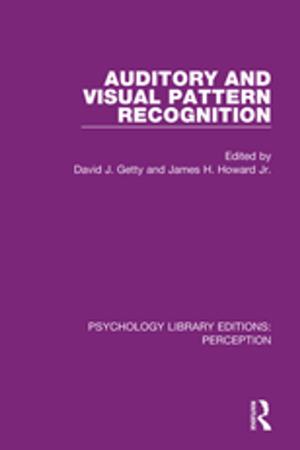Introducing Piaget
A guide for practitioners and students in early years education
Nonfiction, Reference & Language, Education & Teaching, Preschool & Kindergarten, Educational Theory, Educational Psychology| Author: | Ann Marie Halpenny, Jan Pettersen | ISBN: | 9781136280306 |
| Publisher: | Taylor and Francis | Publication: | August 22, 2013 |
| Imprint: | Routledge | Language: | English |
| Author: | Ann Marie Halpenny, Jan Pettersen |
| ISBN: | 9781136280306 |
| Publisher: | Taylor and Francis |
| Publication: | August 22, 2013 |
| Imprint: | Routledge |
| Language: | English |
Jean Piaget was one of the most significant contributors to our current understanding of how children think and learn, from birth through to adolescence. In this comprehensive and accessible new book, Ann Marie Halpenny and Jan Pettersen capture the key concepts and principles of Piaget’s fascinating work on children’s thinking, and explore how thinking evolves and develops from infancy through the early years and beyond.
Areas covered in Introducing Piaget include:
- key milestones and achievements in children’s thinking;
- understanding the physical world through senses and movement in infancy;
- supporting the emergence of symbolic thought and language in the early years;
- understanding object permanence;
- implications of egocentric thinking in early childhood learning and development.
Throughout the book, the consequences of these developments for children’s social, emotional and intellectual development are discussed. Updates on Piaget’s theory are also outlined with reference to more recent work on cognitive development in childhood. Each chapter provides a concise summary of material presented through a consideration of the implications for practice in working with children. A glossary of key Piagetian terms is also included. With a particular focus on how Piaget’s principles and concepts can be applied to children in early childhood, this exciting new book is an invaluable resource for teachers, practitioners and students with an interest in learning and development in the early years.
Jean Piaget was one of the most significant contributors to our current understanding of how children think and learn, from birth through to adolescence. In this comprehensive and accessible new book, Ann Marie Halpenny and Jan Pettersen capture the key concepts and principles of Piaget’s fascinating work on children’s thinking, and explore how thinking evolves and develops from infancy through the early years and beyond.
Areas covered in Introducing Piaget include:
- key milestones and achievements in children’s thinking;
- understanding the physical world through senses and movement in infancy;
- supporting the emergence of symbolic thought and language in the early years;
- understanding object permanence;
- implications of egocentric thinking in early childhood learning and development.
Throughout the book, the consequences of these developments for children’s social, emotional and intellectual development are discussed. Updates on Piaget’s theory are also outlined with reference to more recent work on cognitive development in childhood. Each chapter provides a concise summary of material presented through a consideration of the implications for practice in working with children. A glossary of key Piagetian terms is also included. With a particular focus on how Piaget’s principles and concepts can be applied to children in early childhood, this exciting new book is an invaluable resource for teachers, practitioners and students with an interest in learning and development in the early years.















